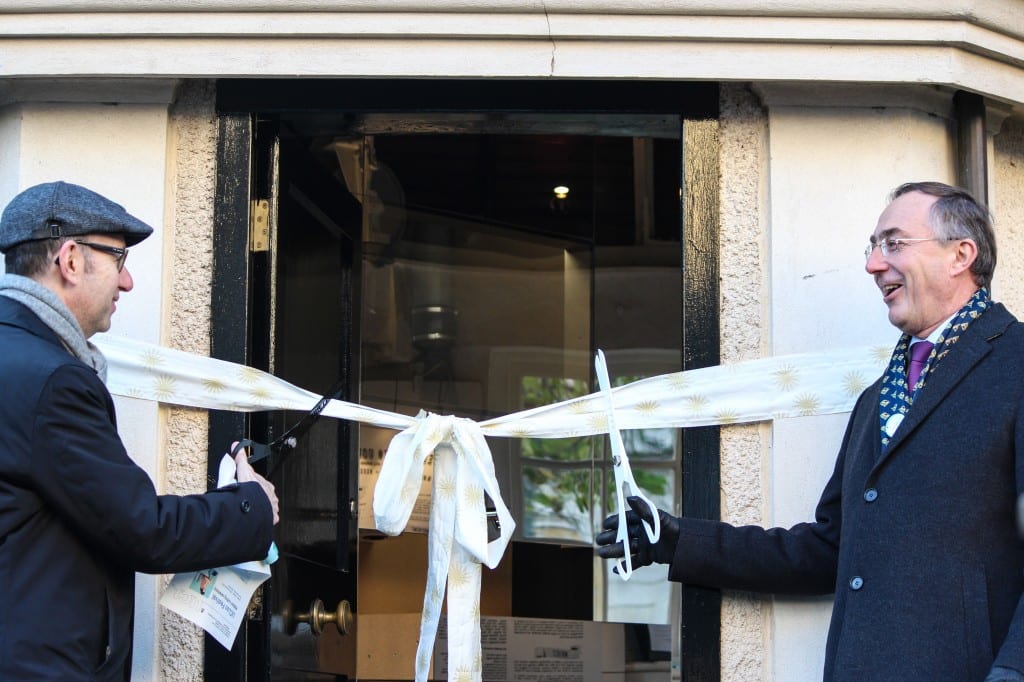UCLoo Festival kickstarts the eco-sanitation discussion
By news editor, on 25 November 2013
Written by Kate Oliver, Faculty Communications Manager for UCL Engineering
It’s a cold November afternoon and UCL’s President & Provost is standing in the Main Quad, waiting for the newest loo on campus to be free. He’s not the only one; a queue of students, staff and miscellaneous toilet fans snakes past the Portico, hinting at the fact that a further 2.6 million people are still waiting for their toilets.

The sudden enthusiasm for sanitation is not a campus crisis: the loo in question is a special environmental composting model, installed in the Quad as the centrepiece of UCLoo Festival. Kicking off on the first UN-recognised World Toilet Day (19 Nov, of course) these two weeks of activities, events and exhibitions invite London to UCL, hoping to start a discussion about the future of water-based sanitation in urban environments, as well as raising awareness of sanitation issues worldwide.
Despite the inclement weather, Professor Michael Arthur came out to cut the toilet roll ‘ribbon’ and reveal the North Observatory’s temporary new look as a high-tech, low impact bathroom. It’s not recorded whether he took the team of UCL Bartlett and UCL Engineering staff up on their offer to inaugurate the facilities, but he did take the time to explore the temporary new look of the 19th-century astronomers’ hideout.
Extensive work by Chee Kit Lai, of Mobile Studio, with help from UCL Estates, has transformed the small space, now walled in mirrors and boasting an ‘Envirolet’ – an ecological toilet that uses only 200ml of water per flush and stores all waste in a sealed tank. Visitors are invited to test-drive this urban-enabled eco-toilet and feedback on their experience, both through discussion with the toilet attendants and through the more traditional medium of a toilet graffiti wall.
There’s more to see in the second smallest room in the Quad, as an exhibition of radical toilet designs is currently on show in the North Lodge (a diverse selection incorporating ergonomy and worms, but more on those later), along with a brief history of sanitation in London.
Through pioneers like Edwin Chadwick and Joseph Bazalgette, Victorian London was the centre of a sanitation revolution, but given modern droughts and water shortages, the water and porcelain solutions they came up with may be living on borrowed time. (If you want to see Joseph Bazalgette’s magnum opus, the Grade 1 listed Crossness pumping station, sign up for the Crossness educational trip on the afternoon of 29 November)
My toilet day was rounded off by the ‘Meet the Makers’ evening session at the Institute of Making: three talks from folk rethinking the humble toilet. Scott Smith from Sancor, the makers of the toilet currently occupying the Quad, explained how their six-way ventilation system allowed for an urban composting toilet that only needs emptying once a year.
For more rural environments, Clare Furlong took us through the research process that she followed to harness the power of worms into the ‘Tiger Toilet’ – bringing along some of her wiggly collaborators for illustration purposes.
Finally, Fernanda Costa from Loowatt explained her company’s award-winning ideas for a two-stage processing system, taking waste in biodegradable bags to a digester before processing them into compost and biogas in a local combined heat and power plant facility.
The ideas on show were rather revolutionary, and the keen young makers who have taken up the Toilet Make-a-thon challenge, in association with the Institute of Making, had plenty to digest. They’ll be working to come up with some kind of eco-sanitation solution for the Bloomsbury area over the next two weeks, and will show their results at the closing ceremony of the festival.
UCL staff, students, friends, neighbours and indeed anyone passing by are warmly invited to examine the toilet exhibitions, take the Loo Tours, attend lavatorial lectures, and generally let their thoughts on the future of effluent flow freely. The toilet and exhibition are open from 10am – 6pm daily, while the times of tours, lectures, family friendly exhibitions and more can be seen on the website. Drop in!
 Close
Close

